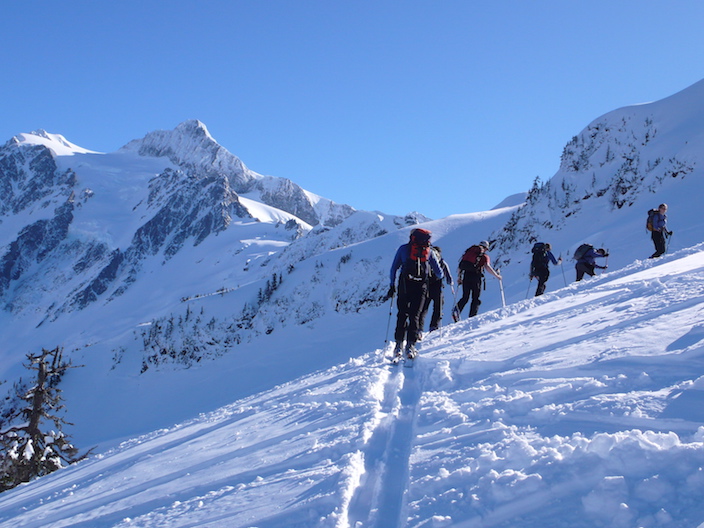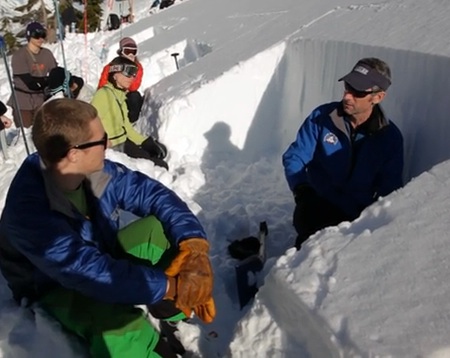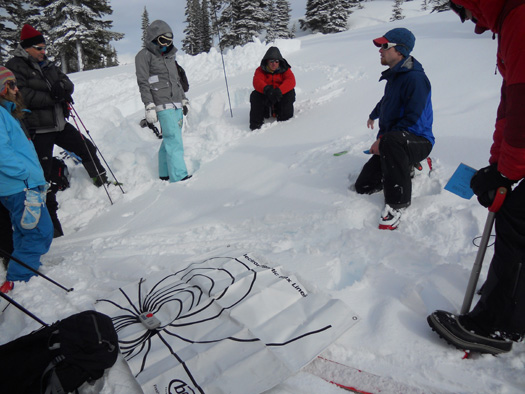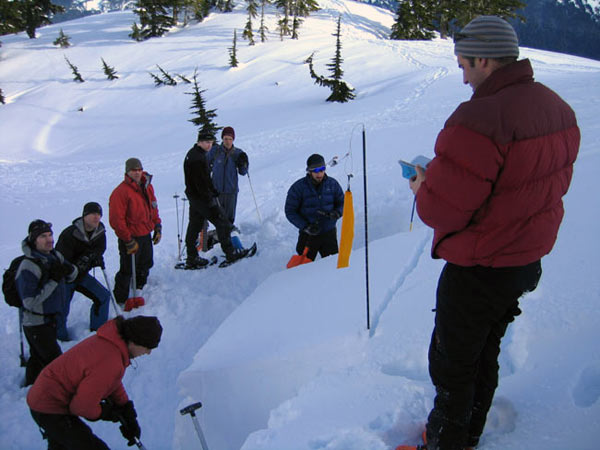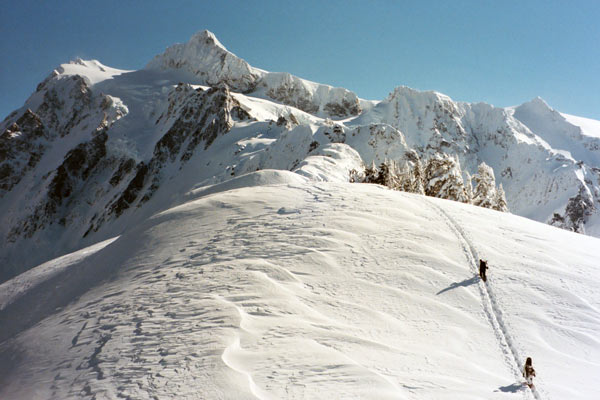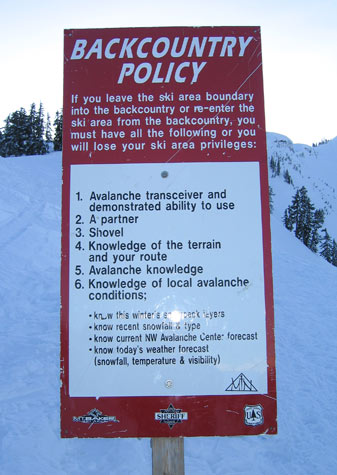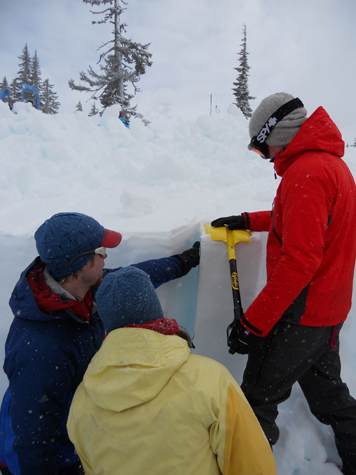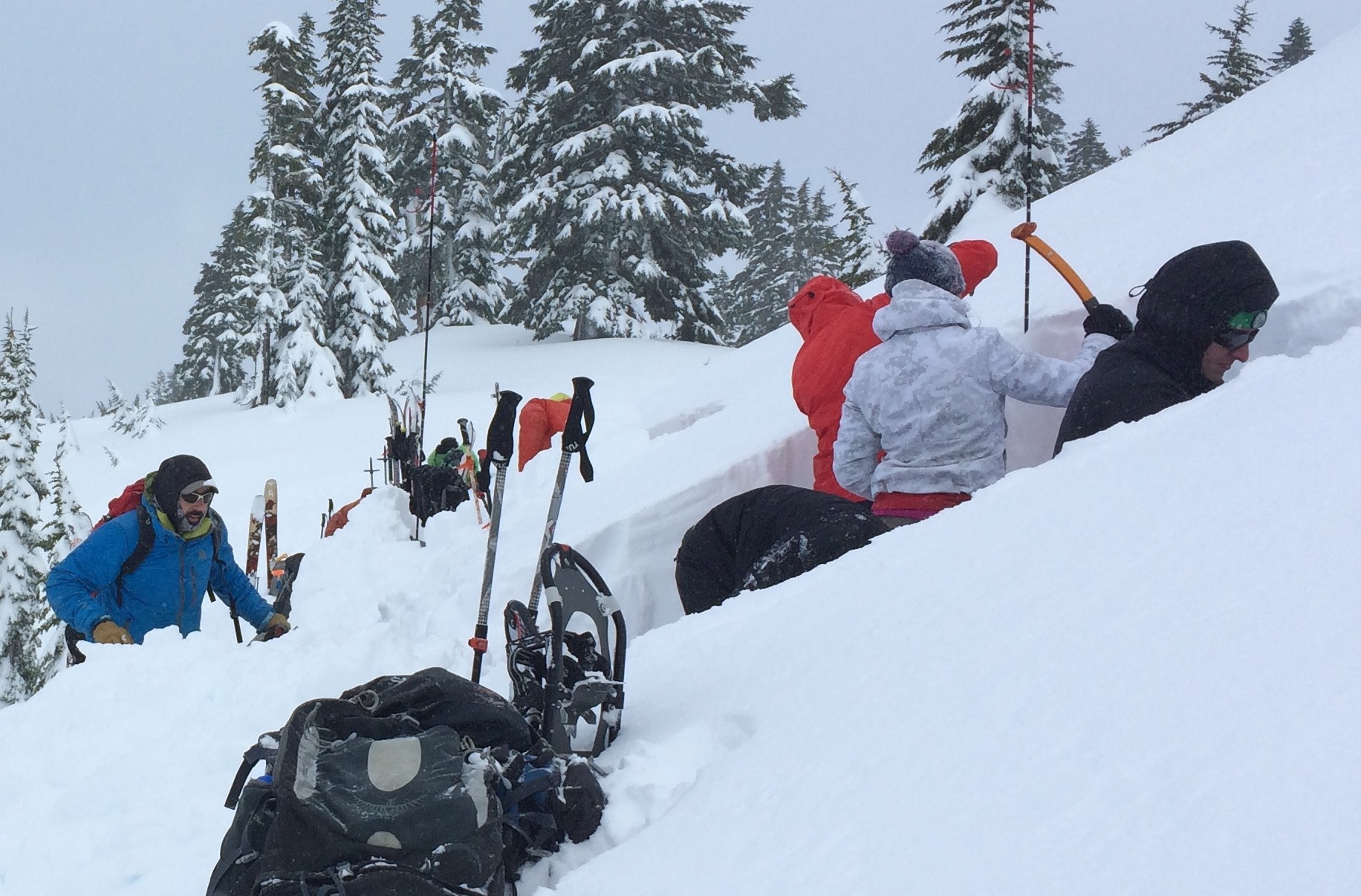Avalanche Training - AIARE 1 Overview Ready to step out of bounds and into the backcountry? Knowing how to judge avalanche conditions, where it's more dangerous to travel versus where it is less dangerous, and being able to carry out a successful rescue if caught in an avalanche, are essential skills that everyone should be aware of and familiar with before heading into the backcountry.
On average 37 people are killed each year by avalanches in the United States alone. Almost all of these avalanches are started by the people caught in them. Some basic level of training and knowledge can dramatically increase your margin of safety while traveling in the backcountry.
Avalanche Level 1 from John Grace on Vimeo .
This course is intended for people interested in backcountry skiing , splitboarding , ski mountaineering , snowshoeing, or virtually any activity in the winter mountains. We will teach students what to look for in the snow pack, how to test stability, how to read terrain and avoid danger zones, and how to rescue themselves and partners if caught in an avalanche.
If you are unable to make any of the scheduled course dates, or are interested in any variation of the AIARE Avalanche program, please contact us.
Course Goals and Objectives The goals of this course are to:
Provide a basic understanding of avalanches.
Describe a framework for decision making and risk management in avalanche terrain.
Focus less on providing "answers" and more on identifying the right questions.
Provide lessons and exercises that are practically oriented, useful, and applicable in the field.
Analyzing compression test results. Dyan Padagas
The objectives of this course are to teach:
Types of avalanches
Characteristics of avalanches
An introduction to how avalanches form and release
Avalanche terrain
Trip planning and preparation
Travel techniques
Decision making
Avalanche rescue
This course does not cover snow science or avalanche technology in any detail. While it touches on and introduces advanced subjects such as snowpack development and metamorphism, these are discussed at a basic, non-technical level.
Course Summary Backcountry riders booting up Shuksan Arm after ducking the ropes at Mount Baker Ski Area.
When you leave this course you can expect to have a good grounding in how to prepare for and carry out a trip, basic decision making while in the field, and rescue techniques required to find and dig up a buried person if an avalanche occurs. Most of these techniques require extensive practice before you can expect to be proficient and no course, this one included, can provide all that experience.
To establish and maintain proficiency in the knowledge and techniques covered in this course, one will have to practice extensively and regularly on their own after leaving the program.
Testimonials
"Great instructors, super knowledgeable, with strong expertise and the ability to teach in an accessible way. I felt cared for, safe, and that we made decisions in our best interest. Fun to be around and made sure we got what we wanted out of the program ."Madison Hendrix (Bellingham, WA)
" I find snow science and mountain knowledge fascinating, to have guides that could dish it out at the ready, with an answer for every question and experience to back it up was a true treat. I've taken courses before that just didn't seem to deliver on the cost. This exceeded my expectations. Glad I made the decision to go through the AAI and commit the money. Well worth it--thanks to the guides." Adrienne Schofhauser (Seattle, WA)
"The reason for getting this as a gift is because my brother told me he wants to get into backcountry skiing this season. As an experienced backcountry skier myself, I know that this is the best gift I could get him. I won't always be there with him, and he needs to know what he's doing out there, so I hope he learns a lot." Denny Palmer (Helena, MT)
"The Avalanche Level 1 course was an awesome experience. The instructors were exceptional. The level of professionalism far surpassed any of my expectations. Thank you for a great opportunity. I look forward to taking the Level 2 course next!" Erin Moriarty (Bellingham, WA)
Avalanche Training - AIARE 1 Curriculum
American Institute for Avalanche Research and Education (AIARE) was founded to provide instructors with the tools to educate students about the knowledge and decision making skills necessary to travel in avalanche terrain.
The American Alpine Institute's Avalanche Course instructors are AIARE-trained instructors and will teach the standardized AIARE curriculum on each course.
There is no nationally recognized curriculum for avalanche education in the USA. There are many avalanche courses and programs available but in large part, course providers operate according to their own personal beliefs and ideas. There are few means for the public to assess the quality of an avalanche course or instructor.
AIARE was formed to address this situation. They have developed and continue to develop standardized curriculum for a complete program of avalanche courses that meets the needs of students at all levels, from recreational to professional and from novice to advanced.
AIARE has created and will continue to create course materials for instructors and students to maximize the effectiveness of both teachers and learners. They require instructors to meet pre-requisites and attend a training session before they are allowed access to AIARE materials and curriculum. In addition, instructors are required to sign an agreement stating they will abide by the guidelines established by AIARE and they are required to attend regular refreshers to maintain and improve their avalanche knowledge, instructional skills, and their understanding of the evolving AIARE curriculum and materials.
Over the past few years, AIARE has developed an Online Training to go along with the standard classroom and in-field coursework. In the past, this online curriculum was presented as an optional component to the training, even though it added a large amount of value and gave students time to gradually digest the course material over a longer period of time and in the comfort of their own home.
This year, after receiving feedback from both instructors and students on how valuable the online training was in helping students have a better understanding of the concepts presented in the course, AIARE has made the Online Training a mandatory part of the AIARE Rec 1 Curriculum.
The Online Training adds an additional 8 hours of self-paced online instruction to the traditional 3 day/24 hour course to even further deepen students’ understanding of new avalanche terminology and concepts. The online instruction and resources give students the opportunity to go as in depth as needed, allowing students to individualize their instruction. The increase in total instructional time frees up more face-to-face classroom and field time to focus on skills development, giving students more time in the field working with an instructor.
The online instruction is an integral part of this course; it is not a supplementary activity. Students will find themselves significantly behind if they are not able to complete the assignment or look over the content. Since this additional time is critical to the success of each student on the course, registrations for these courses will be closed 1 week before the start date.
Through a relevant and engaging assignment, students will develop a basic understanding of avalanche terminology, identifying avalanche terrain, and how the mountain snowpack forms. Knowledge quizzes allow students to check their understanding to be as prepared to take the most away from their face- to-face instruction. They will also learn how to apply the information provided by forecast centers to their trip plans, allowing for more practice planning trips during a course.
Avalanche Training - AIARE 1 Dates We offer two options for our courses:
Hybrid courses with two online evening interactive lectures mid-week plus two in-person field days
Or
Standard courses with one full day in-person classroom session plus two in-person field days (Veterans using GI Bill benefits must enroll in these standard, in-person sessions)
Each session has a maximum ratio of 6 students per instructor.
Hybrid Courses
Unless otherwise noted, these session will have the format of 2 evening online lectures from 6 - 10pm, followed by 2 in-person field days.
Dec 03 & 05 Zoom Lessons, Dec 07-08 Field Days
Dec 10 & 12 Zoom Lessons, Dec 14-15 Field Days
Dec 17 & 19 Zoom Lessons, Dec 21-22 Field Days
Dec 24 & 26 Zoom Lessons, Dec 28-29 Field Days
Dec 31 & Jan 02 Zoom Lessons, Jan 4-5 Field Days
Jan 07 & 09 Zoom Lessons, Jan 11-12 Field Days
Jan 14 & 16 Zoom Lesssons, Jan 18-19 Field Days
Jan 28 & 30 Zoom Lessons, Feb 01-02 Field Days
Feb 04 & 06 Zoom Lessons, Feb 08-09 Field Days
Feb 11 & 13 Zoom Lessons, Feb 15-16 Field Days
Feb 25 & 27 Zoom Days, March 01-02 Field Days
March 04 & 06 Zoom Days, March 8-9 Field Days
March 11 & 13 Zoom Days, March 15-16 Field Days
Standard Courses
These sessions are held mid-week with the lectures starting at 7:45 AM and running through mid-afternoon. The two field days will directly follow.
Dec 10-12
Jan 14-16
Jan 28-30
Feb 25-27
All courses need a minimum of 4 participants. For those coming from out of town, it is recommend that your lodging have good internet access. You will need to be able to access the avalanche forecasts the evenings before your field days so that you can do your planning homework.
If you want more comprehensive introduction to the backcountry, these Mt. Baker-based avalanche courses can also be combined with a one-day Introduction to Backcountry Skiing (or a two-day Introduction to Splitboarding) and also the AIARE Avalanche Rescue Course. Check out our Winter Backcountry Skills Comprehensive Part 1 and get a discount on the three combined courses!
Other Washington Locations Online Lecture Sessions with Field Days at Mt. Rainier Nat'l Park
These courses will have their lectures online in the evening followed by two days of in-field instruction at Mt. Rainier National Park.
Special Courses
THIS IS A SPLITBOARD-FOCUSED COURSE IN PARTNERSHIP WITH WESTON SPLITBOARDS!
Not available in 2023-2024
Nothing says love like a little splitboarding! Join us starting Feb 14 for a splitboard-specific AIARE 1 course in the Stevens Pass Zone with Weston!
In partnership with Weston BackcountryWeston splitboards to course participants (first-come, first-served, limited supply available). Once you've submitted your Online Registration and been confirmed on the course, you will be sent a special coupon code to be used for your free demo rental. Please make your board reservation through the online Equipment Shop in order to reserve your board.
Please note that an AIARE Rec 1 course is not an appropriate course to be using a backcountry set-up for the first time. If you don't already have splitboard experience, you should take our Intro to Splitboarding Course before this AIARE 1 to learn the fundamentals of moving in the backcountry with the equipment. Learning these basic skill ahead of time will allow you to better focus on the avalanche curriculum of the AIARE Rec 1.
Avalanche Training - AIARE 1 Motorized Courses Snowmobile Specific Courses
Our snowmobile courses have sold out for the season.
If you're a motorized user of the backcountry, such as a snowmobiler or snowbiker, please check out our Snowmobile AIARE Course page for more information.
On average, 37 people are killed each year by avalanches in the United States alone. According to AIARE, in the last five years, 25% of the avalanche fatalities have been folks on snowmobiles or snowbikes. Almost all of these slides are started by the people caught in them.
Highmarking and other snowmobile acrobatics can be particularly dangerous, but any travel in mountainous or hilly terrain puts you at risk, and the speed and power of a snow machine means you can move into danger that much faster. See our specialized snowmobile avalanche course page to check out dates and register for the coming season.
Avalanche Training - AIARE 1 Details Prerequisites If you are a skier or snowboarder, you will need to have previous backcountry experience on your touring skis or splitboard. The field days of your Avalanche Course should not be the first time you are on your backcountry setup. If you do not have this experience yet, you can sign up for either our Into to Backcountry Skiing Course or our Intro to Splitboarding Course before taking your AIARE 1. If you do not have previous backcountry experience and are not able to attend one of these Intro Courses, please plan on using snow shoes for the field days of your AIARE 1 Course. If snowboarders do not have a splitboard, you are welcome to use snowshoes for the hike uphill then snowboard down, however this can often be more cumbersom.
In addition to the backcounty experience mentioned above, you should also:
Have good physical fitness, including being able to hike for multiple hours with a 20 - 35lb backpack with minimal breaks Be able to dress appropriately for being outside in snowy, winter conditions and be outside for a full day Be able to maintain your personal nutrition and hydration needs throughout the day (you may not have an official break for lunches - these are often done "on the go" - so you need to be able to manage your personal needs in this regard). If you have extenuating circumstances, please be sure to notify both the Administrative office when registering and also notify your Course Leader on the first morning of your course so they are aware.
Rental Equipment Avalanche Gear
The AAI Equipment Shop rents avalanche gear, including beacons, probes, and shovels.
We also have packs and ski poles for rent, see AAI rental pricing sheet.
WE HAVE BACKCOUNTRY SKIS!
WE ALSO HAVE SPLITBOARDS!
See AAI rental pricing sheet or contact our shop at 360-671-1570 for more information.
There are also skis and snowboards available for rent at the Glacier Ski Shop at 360-599-1943.
Logistics and Lodging for Bellingham Courses The course runs 7:30am to 5pm each day, you must provide your own transportation, food and lodging throughout the course. The classroom lecture sessions takes place near AAI's equipment shop. We are located 90 miles north of Seattle on I-5. To get to AAI, take Exit 250 (Old Fairhaven Pkwy) and turn west toward Fairhaven. After 1 mile you will reach a stoplight at 12th Street. Turn right on 12th Street and park immediately. AAI's administrative office is the first building on the right, the equipment shop is the second building on the right.
In Person Lecture - We meet at 7:45am at the Our Saviour's Lutheran Church on the corner of 18th St and Harris Ave (1720 Harris Ave) Field Day 1 - Meet at 7:45am at Mount Baker Ski Area which is a 1 hr 30 min drive from Bellingham, for a day spent in the field. See the Mount Baker Ski Area website .
Field Day 2 - Meet at 7:45am at Mount Baker Ski Area for the second field day, practicing the skills you learn in the previous days, and executing a planned backcountry ski tour.
Lodging Options
It is recommend that your lodging have good internet access. You will need to be able to access the avalanche forecasts the evenings before your field days so that you can do your planning homework.
Stay each night in a Bellingham hotel and commute both to AAI and Mt. Baker Ski Area each day. The Best Western Plus on Bennett Dr. provides discounts to all AAI program participants; just let them know you are on an AAI course. Another option is the Days Inn at 215 Samish Way, Bellingham - (360) 734-8830.
Camp for approximately $25 per night at Larrabee State Park , located 5 miles south of AAI right on the beach.
There are plenty of vacation rental cabins in the town of Glacier, 20 minutes from Mount Baker Ski Area. See Mount Baker Lodging for cabin options. There is usually a two-night minimum.
You can check availability for the Mount Baker Lodge, which is owned and operated by The Mountaineers. This is the only place to stay that is actually at the ski area, and is very economically priced. It's a rustic place, and you must pitch in with chores. Go to the Mountaineers website for more information on the lodge.
Avalanche Training - AIARE 1 Related Courses
Program Finder
By Location
United States - Alaska
United States - Washington
United States - California
United States - Nevada
United States - Colorado
United States - Utah
Canada - British Columbia
South America - Argentina
South America - Bolivia
South America - Ecuador
South America - Patagonia
South America - Peru
Europe - Alps and Caucasus
Asia - Nepal and Tibet
Asia - Laos, Thailand, & Vietnam
Asia - China
Asia - Japan
Africa - Tanzania
Pacific and Antarctica
By Program Type
Instructional Courses
Group Summit Climbs
Expeditions
Skills Expeditions
Private Guided Programs
Treks, Tours, & Backpacking
Corporate Outings & Services
Government & Military
By Activity
Rock Climbing
Ice Climbing
Alpine Climbing
High-Altitude Climbing
Trekking and Backpacking
Skiing & Snowboarding
Guide Training & Rescue
Avalanche Training
Departure Month
Difficulty Level
Beginner
Moderate
Intermediate
Advanced
Very Advanced
x
